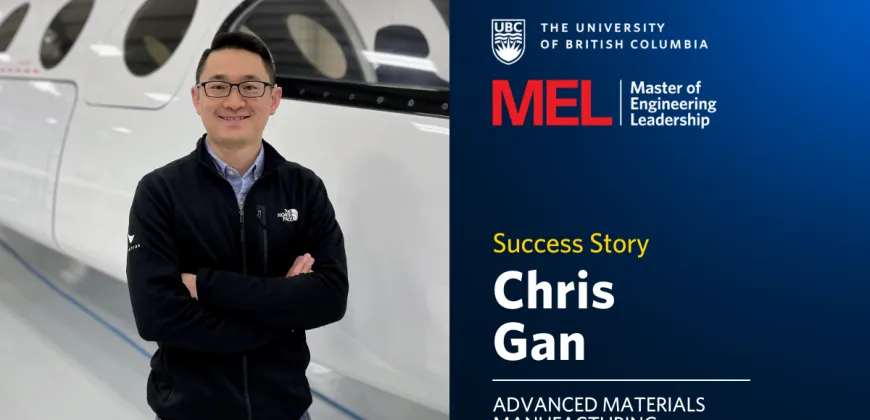Success Story: Chris Gan
While working as an aircraft structure engineer, Chris realized that he wanted to elevate his career. To fulfil his interests in developing leadership, communications and technical skills such as the use of new materials and technology to increase efficiency, he decided that the MEL in Advanced Materials Manufacturing was the perfect fit for him.

Hiring managers in the manufacturing, aerospace and automotive sectors are challenged to find employees who have both the technical domain expertise and the project management, communication and leadership skills to successfully guide teams and oversee complex projects.
The UBC Master of Engineering Leadership (MEL) in Advanced Materials Manufacturing was designed to address this need. The degree combines graduate courses on the latest advances in composite materials and manufacturing and taught by leading researchers from the UBC Faculty of Applied Science with courses on business and leadership taught through UBC Sauder’s Robert H. Lee Graduate School.
This unique interdisciplinary education made the program very appealing to Chris Gan, who wanted to expand his knowledge of advanced materials and gain tangible business skills.
After graduating with a degree in mechanical engineering in 2014, Gan worked as an aircraft structures engineer for seven years. He was a member of multidisciplinary teams working on design changes and modifications to integrate new avionics, interiors, cabin systems and mission systems to aircraft. Among other projects, this included installations of troop seat interiors, medvac systems, external cameras and emergency equipment.
“I’ve long been interested in the new materials and technologies being adopted by the aerospace industry to reduce weight, improve service life and fuel efficiency,” he says. “Composite materials are shaping the future of airframes, and I wanted to learn more about this material. I also recognize that this is an industry that requires strong leadership and communication skills to make change happen. I wanted a program where I could gain some new technical skills and deepen my business skills to be part of this change.”
With its balanced offering of engineering and leadership classes, the MEL in Advanced Materials Manufacturing was the degree he was looking for. “I am interested in being a technical integrator. This program was a perfect fit for me.”
An integrated understanding of materials manufacturing
Program director Casey Keulen says that the MEL in Advanced Materials Manufacturing was designed to expand students’ technical knowledge of materials manufacturing while gaining a fundamental understanding in business and management. This skill set is achieved through carefully sequenced courses on advanced simulation and modelling tools, advanced composite materials and case studies in advanced materials manufacturing. Students also complete a year-long capstone project along with two electives in an area of their interest.
It’s an industry-driven curriculum that matches the current and future needs of employers. “Students graduate with upgraded engineering skills and knowledge of the latest advances in composite materials, intelligent manufacturing and simulation software,” says Keulen. “Our program is grounded in case studies and project work, enabling our students to learn from real-world manufacturing issues.”
In one course, for example, Gan completed a “well to wheel” lifecycle analysis of potential materials for automotive wheels to evaluate the trade-offs of fuel efficiency achieved through lower vehicle weights with the energy required for material extraction, processing and manufacturing. In another class, he learned the full spectrum of composite materials manufacturing and application, and completed a study on the development and application of 3D-printed composite materials.
Developing new strengths in communication and leadership
Leading complex projects and managing interdisciplinary teams requires skills in project management, communication, change management and leadership.
Students in the MEL in Advanced Materials Manufacturing learn these skills through business and leadership courses taught through UBC Sauder’s Robert H. Lee Graduate School. They take classes on organizational leadership, strategy and innovation, and sustainability and leadership.
An intense four-week business boot camp exposes students to six core business competencies, from accounting and contract management to business case development, and students can also take an additional business course of their choosing.
Case studies, class discussions and group projects empower students to strengthen their skills in communication, collaboration, leadership and group dynamics.
“Every day I use the knowledge I gained in the very first business course on organizational leadership,” says Gan. “It helped me understand different leadership styles and it’s enabled me to broaden the way I communicate with people. A large part of my current job is coordinating with a multidisciplinary team that includes design, planning, manufacturing, operation and flight testing, and thanks to this course I am able to adapt my communications to keep the work flow moving forward.”
Working on the world’s first electric-powered commuter plane
Gan wanted to move into a role where he could bring together his background in aerostructure design with his new knowledge of materials and manufacturing. One company he’d long been interested was Eviation Aircraft, a company creating the world’s first all-electric commuter aircraft. After completing his coursework, Gan moved to Washington State in December 2021 to begin working for Eviation as a production and manufacturing engineer, providing engineering support coordination for the prototype aircraft.
“I believe the MEL helped me get this job,” he says. “It’s a interdisciplinary degree for those like me who want to be technical leaders in complex corporate environments. My experience is that it helps deepen specific technical capabilities, build communication and leadership skills, and lay the foundation to understand overall corporate operation and strategy.”
He thinks employers should be interested in hiring MEL grads for the unique combination of skills they bring to an organization. “For large and complex projects, you need integrators who understand not only how things work technically, but also understand how people work so that you can bring teams together and achieve results.”